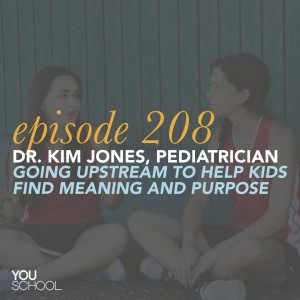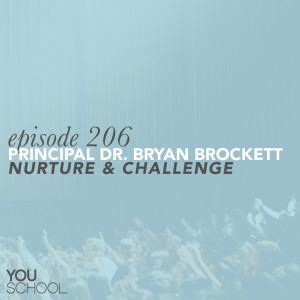Episodes

Monday Oct 28, 2019
208 Dr. Kim Jones -- Going Upstream to Help Kids Find Meaning and Purpose
Monday Oct 28, 2019
Monday Oct 28, 2019
Dr. Kim Jones of Palo Alto had a thriving practice as a pediatrician until she noticed a shift- more and more kids were coming in with anxiety and depression. Over time she realized she wanted to do more to support students upstream, not just in crisis intervention but to guide kids to discover meaning and purpose in their lives. Listen in on an important conversation between Scott Schimmel and Dr. Kim Jones.
Also video available: https://vimeo.com/369211340

Wednesday Oct 16, 2019
207 Principal Jesse Schuveiller -- Home Court Advantage for Every Student
Wednesday Oct 16, 2019
Wednesday Oct 16, 2019
Before coming to Sage Creek, Schuveiller worked at a multitude of schools, including La Costa Canyon, Fallbrook High School, Del Norte High School and Park City High School. Not only has he held the role of assistant principal three times, but he has also been an English teacher, AVID teacher, varsity baseball coach and an English Department Chair. In the 2013-2014 school year, Schuveiller was named Fallbrook Union High School District’s teacher of the year and the following year was a San Diego County Teacher of the Year finalist. Read more about Jesse...
(article excerpt from The Sage News)

Tuesday Oct 08, 2019
206 Dr. Bryan Brockett -- Nurture + Challenge
Tuesday Oct 08, 2019
Tuesday Oct 08, 2019
What can a principal do to create a culture where the adults on a campus both care and nurture the social-emotional lives of their students AND challenge them to succeed academically? Dr. Bryan Brockett is the Principal of Carlsbad High School and a cultural architect who's designing an upside down world of high school where all students flourish.
-----------------
1
00:01:41,880 --> 00:02:00,150
Scott Schimmel: Alright, Hey, everybody, this is the YouSchool podcast. I'm your host, Scott Schimmel, and I'm here with a friend of mine. That's also a colleague for the past couple of years. Bryan Brockett principal of Carlsbad High School, he's got a long resume as an educator inside schools and you'll give you a little synopsis of that.
2
00:02:00,150 --> 00:02:22,890
But I just want to say thank you for, for participating taking time out of the day I, I've, as I get to know principals better, I don't know a more complex demanding job than what you do. And so the fact that you carve out even 20 minutes for me means a lot to me. So why don't you just going to share a little bit of your resume not to go into I was born in But what have you kind of been there done that in terms of your education career?
3
00:02:23,580 --> 00:03:02,370
Dr. Bryan Brockett: Well, thanks for having me Actually, Scott, because I you know, as as I've told you, before, just carving out the 20 minutes to sit and talk and have some time to reflect is really valuable, as you know. So it's, it's, it's fun to be with you. But just my background. I'm from the area here in North County and in terms of education, I've taught at both the middle school and high school level. I've rancho santa fe middle school and Torrey Pines High School and then came into after 14 years in the classroom came into the administrative realm in Carlsbad here as an assistant principal at the middle school level and principal, the middle school level and now. It's my third year here at Carlsbad High School.
4
00:03:02,850 --> 00:03:17,430
Scott Schimmel: What's your favorite role? I mean, obviously, you love your job now, in case your boss is listening, but what's been your favorite gig you've had? You know, you know, honestly, being a middle school assistant principal, which I know for a lot of people sounds like maybe
5
00:03:18,990 --> 00:03:59,970
Dr. Bryan Brockett: that'd be a good reality show. Yeah, yeah, no, it's it. But that's a lot of fun. I think the one thing that I miss from being in the assistant principal role is, is you get a lot more hands on with working with students in that. And a lot of the kinds of things that we value in terms of coaching and supporting and really kind of digging in and get to know kids. You don't, I don't get as much opportunity to do that in my role. Now. That's one thing that I certainly Miss, and try to find ways to do and I'm always looking for ways to make sure that I'm connected with our kids and no, it's great. What would what would we if we got to go back in time and see what we like as a middle school teacher, like what would students say about you? How would they experience you we read the funding
6
00:04:00,000 --> 00:04:14,850
I read the intense guy. Yeah, no, it's funny I was I was probably the the fun guy, I like to think that I, you know, got kids well prepared, I was a Spanish teacher. So, in that kind of language, you're always trying to, you know, make sure kids are prepared for the next level.
7
00:04:15,980 --> 00:04:52,460
But I think that I was the guy that I coached as well. And that was really meaningful to me to get to know kids classroom and have that other connection with them. And then, you know, I think I would be that that fun guy that that could, you know, would when I was getting serious or getting, you know, like, to the point in class, and kids knew that that was time to pay attention because that that was, you know, I didn't have to, you know, raise my voice or those kinds of things very often, but sometimes you do and always kind of taken that approach. But if you can prove that then kids know and when they get to know you, they know Okay, this is serious and we need to get moving now.
8
00:04:52,490 --> 00:04:59,060
Scott Schimmel: Yeah. Why? So? Why principal? Why did you want to climb the ladder most people don't want your job.
9
00:05:00,840 --> 00:06:00,000
Dr. Bryan Brockett: Yeah, it's interesting. So I actually for me, one of the real aha was for me was and I thought about administration, I would early in my career, I kind of hit up, I hit a crossroads and thought, do I really want to continue doing this for the rest of my career idea, you know, going back to law school and doing some different things. And and at that time, I realized, like, I really, I really did enjoy being in education. I really enjoyed working with kids. And so I went back at that point, got my administrative credential, and then continued to teach for nine more years because I really enjoyed what I was doing. Yeah. And just had a lot of fun with it. And I'll tell you really, what got me was I got into I had an interest in continuing my career and I got into the doctoral program in Educational Leadership at UCSD and Cal State San Marcos is a joint program. And I started that program as a teacher and people so you know, what are you doing this for? Like, what Why? What's you know, I said, you know, it's because it's an actual
10
00:06:00,000 --> 00:07:00,000
Me I had no, I really had no plan of where I wanted to go. Yeah. But I, as time went on, there was a specific professor in the program that I worked with. You may know Alan daily down at UCSD or anything on before. And we were doing an activity and Alan's class one day, and it was really all about kind of the barriers that we put up for ourselves. And it was something that forced me to really think about who I was where I wanted to go, what I felt like I could contribute. And that was, it was a Saturday afternoon. I absolutely remember we were an all day class, Saturday, Saturday afternoon, I went home that evening. And I said, I gotta do this, I got enough, I'm gonna be for real about what I want to do. I need to take the steps to to, you know, move forward and, and, you know, move into that admin role where I felt like I could bring something to the table. I could benefit, you know, students in schools a little wider level and you're able to do in the classroom. And that was really the turning point for me that they were I realized, you know, no, I think I have some
11
00:07:00,000 --> 00:07:40,680
You know, from a leadership standpoint to bring, and that I can, I can really, you know,I know in any job there's going to be a level of on the job training that you don't really know what you need to know to get there. But when you think about an administration, particularly in a principal of a big High School, big traditional comprehensive high school, like, what were you prepared for? What were you not prepared for? Yeah, I you know, from when I think back to when I started as a, like I said, as a middle school assistant principal, yeah. There is no training. I mean, I remember the things that I was crazy because it's like, well, how do you you know, what if what if you need to suspend a student? What do you do? I had? No, there's
12
00:07:41,700 --> 00:08:00,060
none of that is transferable. I think one thing for me that I got, especially in in the doc program with a focus on educational leadership was that leadership lens and really thinking about my role in terms of my role as a leader right, less, less so you know, always through
13
00:08:00,060 --> 00:08:16,500
lens of just what I knew about education from coming up as a teacher. Yeah. system, but really stepping back and thinking about leadership practice and how you apply an education setting. Yeah. Other than that, yeah, it's it's pretty much all learning on the job.
14
00:08:17,730 --> 00:08:36,150
You know, I don't know, I don't know that a training program exists. That is that is ideal for this. But I think that what you have to bring to the table is is an openness and a willingness to learn. One of the one of the I had some some administrators I worked with previously and I remember to at the same time, and one of them was a guy who
15
00:08:37,230 --> 00:08:59,640
kind of always thought he knew the answer, or at least pretended he knew the answers and things sure which and for a while, that that becomes pretty apparent, you know, that you didn't know the answers to things that he would tell you. He knew the answers to. Right. And I had another administrator who is now you know, one of my counterparts at another school here in North County.
16
00:09:00,630 --> 00:09:34,200
Very solid principal who would always say no, I don't know, but I'll find out. And for me, that was a real aha about, you know what it takes to be successful in this job? Right. I don't know the answers to a lot of the questions that come my way. Yeah. You know, sometimes I have an opinion on them. Sometimes I know the answer. And a lot of times I really don't. And it takes a willingness to say, Hey, I don't know. I'm going to go look into it. Try find out. Yeah. I mean, you're I'm sure you're just constantly that mode. What do I do today? That sounds that sounds exhausting.
17
00:09:36,750 --> 00:09:53,880
People asked about the job. I say that one. There's never a dull moment and to I learned something new every day. I literally do it. Not a day goes by where I don't learn something new. Yeah, with a deal with people or whether it's a technical question or whether it's a legal question. Whether it's a pedagogical question. There's always
18
00:09:55,230 --> 00:10:03,360
Scott Schimmel: now that you're more removed from students, what? What are you doing? What do you do? do to stay connected? What do you do to try to understand their experience?
19
00:10:04,470 --> 00:11:00,090
Dr. Bryan Brockett: You know, one of the goals, you know, I have for this year, I think I shared with you when we talked a while back, really to be intentional about being out in classrooms more this year, right. And that's a good way to connect with with staff and students, right. And if it wasn't in classrooms, just being out on campus, I think, especially at a big, comprehensive high school, there's so much going on that my desk feels like this vortex sometimes, that I'm getting sucked into, and that it's, it's hard to get away from and so just to be able to pick up the computer and go sit out in the quad, you know, that chance to interact with students and staff and go into classrooms. And I you know, I shared that with our teachers, I said, Hey, I might just come in your room and sit up there and I can I can type emails just as easy sitting in the classroom as I can in my desk. So, you know, I think that that's, you know, you have those opportunities for those conversations. You have those opportunities to just see what's going on. Yeah. And, and it's I will tell you, you know,
20
00:11:00,120 --> 00:11:39,840
Scott Schimmel: Since we talked a month or so ago, it's a battle, right? I mean, that's like battle to get away from the things that are sucking me in this week, for example, is is a week where I can say, I feel like I've been in meetings, non stop. And so it's a good chance to reset and say, Okay, what can I do now to get back out and get re engaged? Yeah. Well, I know, you probably don't directly but your assistant principals get a lot of the students that are struggling, that are for whatever the reason is, and there's a certain percentage, I'm sure you probably have a list of the students you know who they are. And then there's certainly especially at Carlsbad High School, there's, there's, there's a lot of common go getters, all stars, hyper involved, high achieving,
21
00:11:40,920 --> 00:11:59,520
but then there's a whole group of students in the middle, and I don't know if that's but what what are you noticing, in this season across, like, what is it like to be a student there? What's the normal experience for the kid in the middle? Yeah, you know, it's a good question. I it's hard to tell sometimes, right? It's
22
00:11:59,970 --> 00:12:59,700
Dr. Bryan Brockett: It's hard to take, you know, I get one lens of sort of anecdotal evidence right on what I think is going on. I know, you know, one thing that made me feel really good at random, went back to school night earlier this week, I ran into it at that event. And she said, You know, I really liked hearing a lot of teachers talk about, you know, connectedness and positional, this year, I feel like that really stood out to me and I certainly got some of the work that we're talking about with our IT IS filtering out in ways that people are hearing. So, you know, my hope is that our middle of the road, you know, sort of kids are feeling that and now they're getting that, that that sense of connection. I think here, you know, one of the things that we always we always talk about is, is finding that point of connection, right? And it's easy to walk into a school with 2400 students and feel disconnected feel, you know, like you you don't have you place here, but it's also really easy to find your niche with kids and share your same interests.
23
00:13:00,120 --> 00:13:20,520
That are passionate about the same things you are that are doing the same kinds of activities and whether that's through sports or arts, or one of our clubs or something like that. You know, that's the that's the advice that I always give. And so I think, you know, my hope is that students recognize that and, and are finding, I think that, you know, our evidence shows here that a lot of our students do have that experience.
24
00:13:21,630 --> 00:13:32,610
On an even bigger level, you know, the question is, you know, there's been another subset almost that doesn't get that, you know, we've, we've talked to you about how ASB we were the most spirited school in the nation.
25
00:13:34,190 --> 00:13:47,210
years ago, he does a great job. You go to the football games on the Friday night, you have all that stuff, but that isn't for everybody, either, you know, where the kids and that you know, even when you have something like that, that spirit that kind of brings a lot of people together.
26
00:13:47,240 --> 00:14:00,050
Scott Schimmel: Yeah, where the kids aren't quite connecting with that event and how do we support them? I can remember my first week of college, it was this orientation week and was eight days of activities and me being
27
00:14:00,080 --> 00:14:03,320
more introverted. I just was like, please stop screaming in my face.
28
00:14:05,360 --> 00:14:09,620
I just want I'm looking for a deep conversation here. I'm not like into exactly rah rah.
29
00:14:10,940 --> 00:15:00,020
When you think about students, classroom and activities and clubs, like, what do you hope that they feel? What do you hope that they kind of experience as it relates to interacting with the adults? Yeah, that's a good question. You know, I hope they feel a sense that someone cares about them. And actually, I should say someone I really that everyone cares about. Yeah, yeah, whatever that interaction is on campus. And we talked about this, you know, up in the front office here, you know, you walk in our office and you've got the attendance office and you got the front desk. And and, you know, I talked to the staff there that they're there, the front line, they're the first person that almost everybody when they interact with Crosby at high school for the first time experiences. So what's that impact that they can have, you know,
30
00:15:00,050 --> 00:15:59,510
Dr. Bryan Brockett: A teacher on a day in day out basis has that same opportunity classroom, it's hard because you got, you know, 30-35 40 Kids class. And it's hard to have that impact on, you know, on an individual level with every kid. But there are things that teachers can do, obviously, that you put out the, the wider, you know, that wider feeling. Good example, this morning, I was out on the front side of campus in a spot where I'm not usually so I'm not usually long classrooms over there. And I'm walking by and, you know, sure enough, there's, you know, one of our teachers second year teacher out the door, you know, greet and all the kids as they come and greet and kids that are walking through the gate from that direction. And that's, you know, just that little thing of, you know, that those kids that either walked in the class or even just walking by the he doesn't know, right, had somebody that said hi to him this morning, you know, yeah, and when we think about our, you know, if we go back to our Maslow's hierarchy, then yeah, that sense that like, wow, I'm here and somebody recognized me and recognize that I'm
31
00:16:00,000 --> 00:16:59,970
Scott Schimmel: present today Yeah, totally goes a long way and starting to starting to his day off in the right way, I think even seen a kid's name, like hear a kid hears their name be said by someone else. And it's all particularly. But actually I don't know, I don't know how to categorize it, it just it just really matters. It feels feels something you feel something when someone knows that. I was talking with someone yesterday that I'm always so hesitant for some reason still, even as an adult married kids, like I should be confident my in who I am at this point. But even when I see a student or a kid that I know, and I know their name I've known for years, I'll still be reserved sometimes. And I just recognize it still feels uncomfortable. Or maybe I'm worried about them. I'm worried about them feeling uncomfortable. I'm worried about feeling like they don't know who I am and feeling rejected. But you know, for the sake of kids, I keep doing it. And that's I think what I certainly learned about you and what you care about as a leader is that everybody would catch that vision. This is why we're here for the sake of these kids. Yeah, no, I
32
00:17:00,000 --> 00:17:14,850
Dr. Bryan Brockett: I can relate, I feel the same way that you do there. You know, it's just, it's, I'm pretty introverted as well. Generally speaking, I much rather spend an evening at home or, you know, if we're going to have, you know, people over friends over, like maybe two friends over, right.
33
00:17:16,500 --> 00:17:22,830
And it's funny people that know me at work, you know, often when I say that they say are really, you know, I can't believe
34
00:17:23,940 --> 00:17:59,940
Scott Schimmel: because, you know, so much of what I think is important about my job is just being out there with people and interact. And yet it's not something that comes naturally to me. Yeah, right. Yeah, interact, right. What do you on that note this one of my last questions for you What? What would be surprising for for let's say your staff about your role, what did they not understand and what's they not know for better and for worse, like, what I wish you knew about this role? I you know, I think that what people probably it's hard to appreciate until you do the job is the red
35
00:18:00,000 --> 00:18:06,030
Dr. Bryan Brockett: Things that we deal with, whether that's whether it starts with you know,
36
00:18:07,050 --> 00:18:32,940
campus safety, to HR issues to student issues to trying to do the positive things and do the do the storytelling and do the recognition for people and in the relationship building the events that go on you know, school like ours the extra curricular activities and athletics take a huge chunk of time. So it's this it's this breadth of
37
00:18:34,260 --> 00:19:00,000
responsibility. And and it's what keeps the job it's interesting to me. It's what makes it never a dull moment when we're here. But I think it's probably hard to appreciate that and honestly, I didn't I didn't come into to this position especially the high school position blind I you know, spent time at a high school nine years, I worked closely with with my administrators there in a variety of capacity.
38
00:19:00,000 --> 00:19:18,900
These I knew what they did. And and I don't think until you sit in the chair at a comprehensive high school like this Do you appreciate, you know just how much how wide the range and responsibilities and and things that you just need to be aware of and paying attention to our and like I said that's the fun and that's also something
39
00:19:20,880 --> 00:19:27,810
go home just drained some days because of that and and but it's it's it all goes with the territory.
40
00:19:27,870 --> 00:19:55,050
Scott Schimmel: Yeah. What's the biggest concern you have these days for students when you see what's going on in their world? Yeah, I you know, I can sort of encompass it all. It I hate to use this word, but it's it's it's student safety and well, I guess I well being. Yeah. So it spans everything from from what we do to make sure that this is a safe environment. And I mean, physically safe, emotionally safe.
41
00:19:56,190 --> 00:19:59,880
Unknown: You know, that we're, you know, we're both edgy.
42
00:19:59,880 --> 00:20:09,420
Educating and also, you know, addressing concerns when, you know, with student vaping and other things, you know, what's going on in schools?
43
00:20:10,680 --> 00:21:00,120
Dr. Bryan Brockett: You know, so So making sure that that that well being is there I end up to err on the side of well being in relationships. And and, you know, think that once we can establish that foundation, the the educational part of it a lot of ways takes care of itself. Yeah. It's not entirely true, of course, but, but it's again, I you know, I heard a speaker a couple years ago who did a whole presentation on Maslow's hierarchy of beans, right. Yeah. We don't often think about that anymore. You know, yes, that's education. One on One, you know, they do read a read of Maslow's hierarchy, they move on things right. And, and it really was an aha, for me Just a reminder at 20 years into my career. Yeah, that's still as relevant today as it was when he came up with that idea. And if we're not hitting those
44
00:21:00,210 --> 00:21:20,700
Unknown: Those base levels with kids. Yeah, it doesn't matter what you're teaching in the classroom. Yeah. So it's that's really it and it comes back to my concern for all of our kids is they feel that they feel that sense of well being. And that hopefully school gives them a positive sense of well being, you know, and doesn't, doesn't beat them down and doesn't drain them completely.
45
00:21:21,090 --> 00:21:59,970
Scott Schimmel: You know, I was talking to the head of a school recently who said that we need to put on pause this idea of culture and connecting with students because our student achievement went down a little bit. So we need to, we need to kind of push on that, you know, sit and reflect and I'm like, well, you might want to reconsider that because I would agree with you as well. If connection comes first connections the foundation students right here for learn more students, you feel careful, want to learn more like, it's not that. I think this is what you and I've talked about quite a bit. It's not that complicated, but it is. It's hard. It's hard enough like that, that Steve Jobs quits.
46
00:22:00,000 --> 00:22:00,780
Simple as hard
47
00:22:02,220 --> 00:22:59,970
Dr. Bryan Brockett: work them. I give you a concrete example of that, that I really think it speaks to that point. We were concerned about our, our cast, you know, state testing schools as well. Yeah. And so one of the steps that we took, we really, you know, we were constantly trying to look at what we do instruction Lee and I'm for teachers to reflect that and, you know, obviously, that goes with the territory, but, um, you know, rather than rather than coming up with, you know, some tremendous new program or something to, you know, prepare for tests and things. Last year, we felt like we really actually what we had was a real effort gap in what our scores, we really just felt like the scores didn't represent what our students were capable of doing. Interesting. So, you know, we went out one of our assistant principals who does our testing work, and I went out and visited every classroom of all of our testing last year. And, and, you know, I like to thank, you know, it's you have to have some credibility.
48
00:23:00,000 --> 00:23:59,970
To be able to then go out to talk to students and have an honest conversation about, hey, here's, here's what we think here's what we see. And here's what we think. Like, is that true? Yeah. And every classroom, we talked to all of our juniors every class that we went to, you know, I said, hey, look, here's, here's what we're seeing, like, Do you guys know why that might be? And in every time I had students that have the common say, Yeah, because, you know, kids aren't trying you know, because where's the messages me for? Here's this that the other and and we started to back up a little bit we started by meeting with our ESP students and really have a real conversation them and getting their input like, what what do you know like, what do you want to know what what should we be messaging out what what messages have you heard? So we had a lot of background to be able to kind of realize that that was the same messages and things that they had been hearing, and we're going to let them and and we went up last year, between eight and 10% in both English language arts you can have without doing really anything
49
00:24:00,000 --> 00:24:01,590
concerted, right?
50
00:24:02,910 --> 00:24:53,130
Yeah, well better than walking around and getting face to face with students and saying, hey, hey, here's what we understand that like you, you may feel like this doesn't matter, we get that and we totally understand. But here's why it does matter in some certain ways. Here's all we're asking really is, is what we ask of you all the time, which is to show up and bring your best self forward and do the best you can. And like, I'm not asking you to study or do anything crazy. I just want you to do the best. And, you know, I think that we can credit most of our increase and all that I mean, I don't want to discount, you know, what the Matthew is doing? Yeah. But I really do think that that effort variable was was reduced. And I think that's a great example of, you know, the relationships. Yes. Like, it's not just me, like once I walk out, like the teacher has a follows routers.
51
00:24:54,420 --> 00:24:59,760
And they've got the relationships to be able to say, hey, yeah, we have here these pieces that we just talked about.
52
00:25:00,000 --> 00:25:27,930
We should be aware of those and the teachers got one of our teachers who said, Yeah, I really want to after you're done, I'm going to address the same thing because it makes me look bad in my aren't bringing an f3. Me and she knew that you know, and was able to address that with her, her students this year. So, you know, they're all totally to me relational things right, but that correspond to academic achievement very easily. Yeah. Well, you're onto something.
53
00:25:29,070 --> 00:26:05,970
Scott Schimmel: There's a, there's a book too, right there. There's a talk to give. And, and, and it's so interesting. There's kind of arguing I felt defensive with a teacher a couple years ago. That's an AP math teacher not to pick on math. But since you brought up math, just like I don't understand, I have so much I need to cover. I don't have time for connection. I don't have time, just push, push, push. And I just said, Well, you know, studies are showing that if kids feel like they're connected to you, they'll do better. So worst case scenario, you actually don't care about kids. You don't want to connect with them. But you want to do your job well, you want to be effective at your job that is actually the strategy to get them there even if we have to kind of bleed your ego
54
00:26:07,170 --> 00:27:00,060
Dr. Bryan Brockett: look and great story along those lines sorry so you know I'm telling stories here because you were telling thing, but we had a we had a we have an AP math teacher teaches our calc bc class, all that stuff. And I had a somebody in the community reached out to me who writes books about communities and they come in and they they're actually based in CrossFit here. So they did a story about Carlsbad. And they they try to tie them to some educational lesson and things and their children's books. But what was as they started to ask around some things, this particular teachers name kept popping up in a few different sources. And so they got including Andy in their book as this math teacher you know, at and actually it turned out to be they do character so it was his dog actually, that was funny, but the spirit of the of the dog was
55
00:27:00,090 --> 00:27:22,830
Really, and the Rosen you know, AP Calculus teacher here across but I think speaks to that fact is you can have that super high academic rigor and still have that that impact and connectedness, iterating relationship and caring in a way that when when you know they want to put you in a book. That's the name that comes out, right.
56
00:27:23,190 --> 00:27:39,270
Scott Schimmel: That's beautiful. We challenge kids to reach their potential. We care for them along the way. It's it's two sides of the same coin. Well, Brian, thank you for taking the time. I love talking to you and hearing how you think and how you lead. So all our best and we look forward to work with you in the future too. So thanks for the time.
57
00:27:39,750 --> 00:27:40,860
Dr. Bryan Brockett: Yeah, thanks. Thanks for having me.

Tuesday Oct 01, 2019
205 Principal Dana Moen -- Adults Connecting With Kids
Tuesday Oct 01, 2019
Tuesday Oct 01, 2019
A little about our guest this week, Dana Moen:
My name is Dana Moen, principal of Classical Academy High School (CAHS). I have the great honor of serving as principal of this distinguished high school. CAHS is passionate about partnering with parents to provide the best education possible so that students become successful thinkers, communicators, and achievers. We provide a rigorous and flexible academic program that meets the University of California A-G requirements. As a Distinguished, award-winning, California public charter school, CAHS offers a nurturing environment teaching students to: work hard, live pure, lead with courage, and honor each other, while preparing students for college, career, and citizenship. CAHS has been recognized by Newsweek magazine as the 136th school in the nation for preparing students for college and number one in San Diego as the best high school for homebuyers in 2016. Classical Academy High School is located in downtown Escondido, is one mile from the 78 and 15 freeways, and is within easy walking distance from the Sprinter station on Valley Parkway.
Read the rest of this entry »
Monday Sep 23, 2019
204 Kevin Kirk -- Former Navy SEAL Making a Wave of Kindness
Monday Sep 23, 2019
Monday Sep 23, 2019
We are a revolutionary social media platform that promotes acts of kindness and tracks good deeds through the passing of coins.
We encourage people to "pay it forward" and share about it online-allowing users to see firsthand how their "ripple" turns into a "wave."
These coins are passed through acts of kindness.
Each coin instructs the recipient to go to MakeaWave.com, where they are directed to type in that coins unique ID and learn what that SPECIFIC coin represents. This gives the ability for these acts of kindness to be attached to its own cause.
Causes can be the birth of a baby, a marriage, or even giving your waiter/waitress a big tip. You can even honor a lost loved one and put the coin in their name! It's up to you, you choose your cause and watch it MAKE A WAVE of kindness!

Monday Sep 23, 2019
203 Dr. Ben Churchill -- Preparing Kids For Life
Monday Sep 23, 2019
Monday Sep 23, 2019
Dr. Churchill is a highly respected educator who is proud to serve in his fourth year as Superintendent of Carlsbad Unified School District.
He is passionate about all aspects of teaching and learning, and is especially interested in classroom technology integration, early learning and kindergarten readiness, workforce development, and career pathways for all students. He previously served as an assistant superintendent of teaching and learning, high school principal, associate principal of curriculum and instruction, and a high school English teacher. He began his 24-year career in education teaching English for six years in China.
Dr. Churchill was recently recognized as the 2019 Innovative Superintendent by the Classroom of the Future Foundation. In addition to serving on the Board of Directors for both the Carlsbad Chamber of Commerce and the Classroom of the Future Foundation, Dr. Churchill is also currently serving as the Chair of the Board of Governors for the North Coastal Consortium for Special Education.
Dr. Churchill earned his Educational Doctorate from Argosy University, a master’s degree in school leadership from Northeastern Illinois University, a master’s degree in teaching and learning from DePaul University, and a bachelor’s degree in philosophy from Valparaiso University. Ben, his wife, and their two school-age daughters live in Carlsbad. The family is thrilled to be part of the active community of parents and other committed stakeholders in the district.
Connect with Dr. Churchill on Instagram, Twitter and Facebook - @SuptChurchill
Read the rest of this entry »
Monday Sep 16, 2019
202 Jorge Espinoza -- Belief Changes Students
Monday Sep 16, 2019
Monday Sep 16, 2019
It seems like only the rare few find work that completely matches and fulfills their unique purpose in this life, and Jorge Espinoza is one of them. An experienced school administrator with a background in school counseling, Mr. Espinoza currently serves as the principal for alternative education in Carlsbad Unified School District just north of San Diego, at Carlsbad Village Academy and Seaside Academy.
Mr. Espinoza is deeply passionate about caring for students and is notorious for doing whatever it takes to demonstrate love and care for students who are struggling to succeed academically.
Read the rest of this entry »

Sunday Sep 08, 2019
201 Laura Spencer -- Design Thinking and School Culture Change
Sunday Sep 08, 2019
Sunday Sep 08, 2019
Dr. Laura Spencer is a leading educator in the area of innovative leadership, teaching, and learning. She has served as a classroom teacher, an edtech director, and most recently as a district administrator who led transformational classroom change through design thinking and industry connections so that all students have learning experiences that value their unique strengths and passions.
Laura speaks across the United States at various conferences to teachers, administrators, and industry on topics ranging from effective leadership, sustainable edtech integration, and building an innovative culture for transformational learning. She is known for her engaging hands-on design thinking workshops and professional development as well.
Laura has been recognized as an Innovative Educator, Administrator of the Year, and San Diego County’s Top Tech Exec, as well as recently winning a CUE Gold Disk and the Classroom of the Future Innovate Award. She’s been featured on The YouSchool and Innovative Pedagogy podcasts. She’s also the President of SDCUE and a founding board member of EquityEDU. She is a proud US Army veteran.
Laura blogs at laurakspencer.com.
Read the rest of this entry »
Friday Jun 07, 2019
047 Paula Intravaia -- Day Dreaming for Wellness
Friday Jun 07, 2019
Friday Jun 07, 2019
We're all about rethinking education, and so is Paula Intravaia.
Influenced by innovative childhood home and school experiences, informed by future-focused educational thinkers and organizations around the globe, with interests in blockchain and XR technology, Paula Intravaia has aspired to bring joyful and meaningful learning to students as a teacher of Art, Kindergarten, 4th Grade, and currently as a TOSA/Design Engineer in San Diego, California.
Follow Paula @CDMdreamers and get in touch with her via LinkedIn.

Friday May 24, 2019
046 -- Laura Spencer Design Thinking & Innovation on Campus
Friday May 24, 2019
Friday May 24, 2019
Laura, a former middle and high school teacher, has focused her educational career on leading transformational change through Design Thinking and real-world connections so that all students have extraordinary learning experiences. She has overseen the implementation of technology-integrated instructional programs, the development of professional development to ensure the ongoing implementation of high standards of instructional practice, and the technical infrastructure to make sure those programs are a success. She’s been recognized as an Innovative Educator, Administrator of the Year, and San Diego County Top Tech Exec, as well as recently winning CUE’s Gold Disk award and the CFF Innovate Award.
Laura shares her ideas by presenting at conferences, including CUE and ISTE, as well as blogging at laurakspencer.com. She also serves as the President of SDCUE, the San Diego affiliate of CUE (Computer Using Educators).

